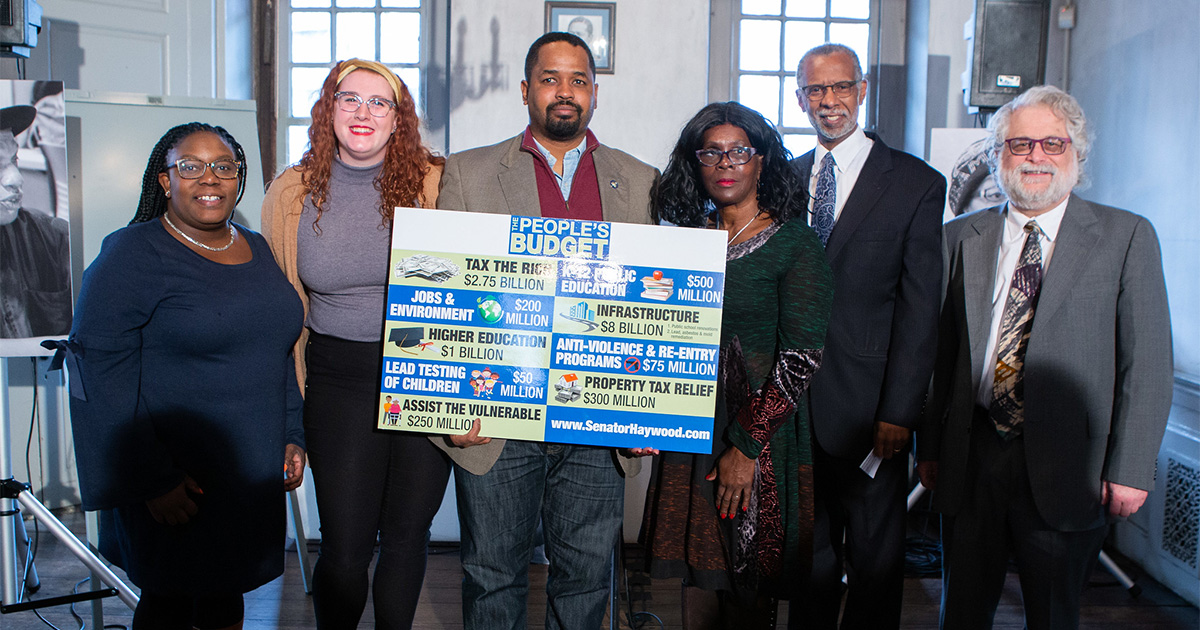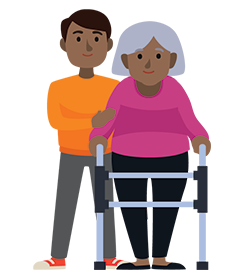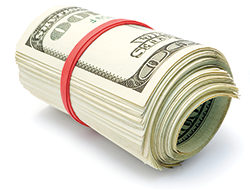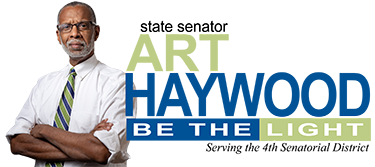Senator Haywood Hosted Dual Event in District on Poverty Solutions
Philadelphia – December 2, 2019 – Senator Art Haywood (D-Montgomery/Philadelphia) joined local elected officials for a dual event focused on economic justice: Senator Haywood announced the People’s Budget and the completion of the Poverty Report at the Johnson House Historic Site in Germantown.
“Through low wages, lack of accessible childcare, unreliable transportation, and poor workforce development efforts, poverty can box many in and the box is hard to break through,” said State Senator Art Haywood (D-Philadelphia). “We can reduce poverty by taxing the rich to pay their fair share to increase revenue and spark productivity in the Commonwealth.”
 “As we do well, we can do good, and investing in ordinary people is good for all communities across our Commonwealth,” said State Senator Sharif Street (D-Philadelphia). “I was pleased to join Senator Haywood to announce my support for a budget that prioritizes working people, making investments in our schools, communities, and infrastructure will move Pennsylvania forward.”
“As we do well, we can do good, and investing in ordinary people is good for all communities across our Commonwealth,” said State Senator Sharif Street (D-Philadelphia). “I was pleased to join Senator Haywood to announce my support for a budget that prioritizes working people, making investments in our schools, communities, and infrastructure will move Pennsylvania forward.”
“It is time for us to do the right thing,” said Councilwoman-elect Kendra Brooks. “Harrisburg doesn’t prioritize people. A people’s budget for Philadelphia means passing a living wage of at least $15 an hour and abolishing the tipped minimum wage. It restores cash assistance for the poor. It also returns local governance to our City, the economic driver of Pennsylvania, by lifting the many preemptions and limitations structurally holding us back. I stand with State Senator Art Haywood and millions across Pennsylvania in calling for a people’s budget demanding collective investment.”
“Poverty is a public health and generational crisis requiring deliberate measures to overcome. It impacts all areas of life: mental, physical and emotional health; wellbeing, developmental progress and educational outcomes,” said State Representative Isabella Fitzgerald (D-203). “For these reasons I support Senator Art Haywood’s People’s Budget, because it represents a comprehensive, well thought out and compassionate plan for Pennsylvanians. It addresses amongst other things: education, human services, tax relief, and criminal justice. It is an action on the road to financial and economic success for all Pennsylvanians.”
“A massive public investment stands in the way of prosperity for most Pennsylvanians,” said Marc Stier, Director of the Pennsylvania Budget and Policy Center. “Senator Haywood’s People’s Budget is a creative proposal to address the public investment deficit by asking the rich to pay their fair share of taxes.”
“Johnson House served as a station on the Underground Railroad; its Quaker family members were deeply involved in abolitionist agitation for the cause of freedom,” said Cornelia Swinson, Executive Director of the Johnson House Historic Site. “As militant abolitionists, their work with others included the most progressive renowned advocates of the country – think William Still, Harriet Tubman, Richard Allen, William Lloyd Garrison, Lucretia Mott, Robert Purvis, and John Brown. As advocates, they engaged in action to address racism and social injustice in the country – human rights, education, health care, employment, housing, family instability, food insecurity – to name a few. Though prominent, the range of the Johnson Family’s antislavery involvement was extraordinary!”
Both the announcement of the People’s Budget and the completion of the Poverty Report are part of an economic justice initiative Senator Haywood will roll out in 2020. The Poverty Report has a special focus on Germantown in Senator Haywood’s district, and its main goals are to improve workforce development and access to childcare for single mothers.

The People’s Budget invests in our future with over $1.5 Billion in new education programs.

$500 Million to Restore Cuts to Higher Education.
Over the last 15 years Pennsylvania’s spending on higher education has declined significantly, from an inflation-adjusted peak of $2.1 Billion in 2005 to slightly under $1.6 Billion in 20171. The People’s Budget restores these cuts by investing $500 Million annually in community colleges, state-related universities, PASSHE colleges, and PHEAA tuition assistance programs.

$500 Million for K-12 Public Education via Accelerated Fair Funding Formula.
The People’s Budget includes an additional $500 Million for Pennsylvania public schools, all of which will be directed through the fair funding formula to the neediest areas and school districts in the Commonwealth.

$500 Million for Refinancing Student Loans & Tuition Assistance at Public Universities.
The People’s Budget will provide $500 Million to alleviate the costs of higher education for Pennsylvania students, including tuition assistance and student loan refinancing for eligible families.

$50 Million for Lead Testing.
The People’s Budget includes an additional $50 Million for Pennsylvania public schools to continue testing for elevated lead levels in water, ensuring that our children have access to safe drinking water at all times.
The People’s Budget Promotes Economic Justice via Strategic Investments.

$50 Million to Restore General Assistance & Fully Fund Human Services.
The People’s Budget invests $50 Million to restore the General Assistance program to help the neediest among us afford life’s essentials during a transitional crisis. The People’s Budget also reverses the drastic underfunding of human services by investing $200 Million needed to address the human services needs of our families, including fully funding child welfare and Parent Pathways programs.

$8 Billion to Fix Our Infrastructure.
The People’s Budget finances a comprehensive investment to repair and restore our infrastructure at nearly twice the level of Governor Wolf’s “Restore PA” initiative. This $8 Billion investment will help bring high-speed internet to the most remote corners of our Commonwealth, address lead, asbestos and mold issues throughout our public schools, facilitate the creation of affordable housing, and more.

$75 Million to Prepare & Protect Our Workers.
The People’s Budget takes a host of approaches to protect the livelihoods of Pennsylvania workers. The People’s Budget includes $75 Million to provide essential job training programs and $200 Million help meet pension obligations and ensure retirement security for our workers.

$300 Million for Property Tax Relief.
The People’s Budget invests $300 million to address the increasingly high burden of property taxes on Commonwealth older adult families.

$75 Million for Criminal Justice Initiatives: Community Anti-Violence & Reentry Programs.
The People’s Budget provides a $50 Million investment in Community Anti-Violence Initiatives under the Pennsylvania Commission of Crime and Delinquency, providing for grant programs that attack and interrupt needless violence at its source. The People’s Budget also provides $25 Million in funding for re-entry programs for formerly incarcerated citizens who served their time and earned the opportunity to rejoin our communities.
REVENUE: The People’s Budget will create over $3 Billion in new annual revenue.

$2.2 Billion via Fair Share Tax Plan.
The People’s Budget cuts the Personal Income Tax (PIT) on wages and interest to 2.8% and introduces a 6.5% rate on “passive” income. According to the Pennsylvania Budget & Policy Center, this “Fair Share” plan will generate $2.2 Billion in new annual revenue and cut $574 Million in taxes for everyday people.

$550 Million in Severance Tax Revenue.
The People’s Budget incorporates Governor Wolf’s 2019 proposal for a price-based severance tax that increases with producer profits.

Other Savings.
The People’s Budget will reduce tax expenditures and close the “Delaware Loophole” that allows corporations to avoid paying taxes in PA.
Here is how you can help make The People’s Budget a reality:
- Call, write and visit your elected officials to encourage them to support The People’s Budget.
- Share your support for The People’s Budget on Facebook, Twitter and Instagram by using
the hashtag #PeoplesBudget.
